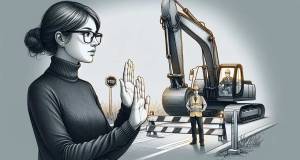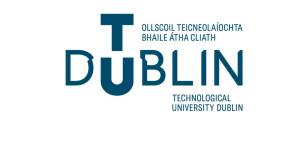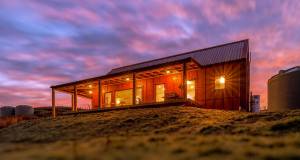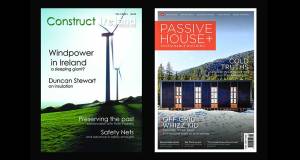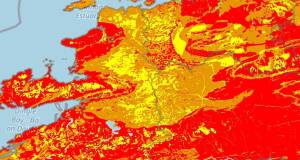- Events
- Posted
New Irish passive house association launched in Dublin
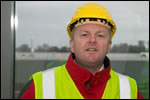
People planning to build a new home could save themselves thousands of
euro each year by developing a passive house, according to the Passive
House Association of Ireland (PHAI), a new low energy design initiative
comprising passive house designers and contractors.
People planning to build a new home could save themselves thousands of euro each year by developing a passive house, according to the Passive House Association of Ireland (PHAI), a new low energy design initiative comprising passive house designers and contractors. The Association, which was officially launched in Dublin last week, will operate in tandem with the International Passive House Association.
Passive house is the term used for a house which has no heating system installed, but whose occupants rely on maximum heat gains from sunlight, high insulation, draught-proofing and heat recovery ventilation for a comfortable and healthy lifestyle.
“Passive houses are leading the way toward a carbon-neutral future by producing more energy than they use and radically reducing fuel bills and C02 emissions”, explained PHAI chairman Martin Murray.
He continued: “The government's building regulations have lead to some improvements in energy efficiency in Ireland, but remain a minimum guide. Those in the construction industry and prospective homeowners, however, need to take the lead and invest in proper design. By doing so their homes will be energy efficient, therefore, helping to reduce their energy bills along with reducing overall CO2 emissions. The infrastructure required to implement such designs is available and affordable in Ireland, despite claims to the contrary from elements within the Irish construction industry.”
Mr. Murray added: “The idea of passive house construction is not new, as there are now over 30,000 examples built world-wide. These include many other types of building besides houses, such as, office-blocks, apartment-blocks, schools, and just recently a Tesco supermarket in Tramore, County Waterford. In each case, the building occupant has made considerable savings by not having to invest heavily in heating oil, gas or other fuel.”
He continued: “Extensive monitoring of these buildings is on-going and the results show that not only are the occupants saving money, but are, in general, hugely satisfied with the product which they have invested in.”
“The role of the association will be to develop the passive house concept of construction within Ireland and attune it to the technologies and market practices prevalent within the country. The experience in other countries is that, such low energy initiatives only flourish, where national associations take on a leadership role of research, promotion and education”, he concluded.
Individual and corporate membership of the association is available.
Passive house is the term used for a house which has no heating system installed, but whose occupants rely on maximum heat gains from sunlight, high insulation, draught-proofing and heat recovery ventilation for a comfortable and healthy lifestyle.
“Passive houses are leading the way toward a carbon-neutral future by producing more energy than they use and radically reducing fuel bills and C02 emissions”, explained PHAI chairman Martin Murray.
He continued: “The government's building regulations have lead to some improvements in energy efficiency in Ireland, but remain a minimum guide. Those in the construction industry and prospective homeowners, however, need to take the lead and invest in proper design. By doing so their homes will be energy efficient, therefore, helping to reduce their energy bills along with reducing overall CO2 emissions. The infrastructure required to implement such designs is available and affordable in Ireland, despite claims to the contrary from elements within the Irish construction industry.”
Mr. Murray added: “The idea of passive house construction is not new, as there are now over 30,000 examples built world-wide. These include many other types of building besides houses, such as, office-blocks, apartment-blocks, schools, and just recently a Tesco supermarket in Tramore, County Waterford. In each case, the building occupant has made considerable savings by not having to invest heavily in heating oil, gas or other fuel.”
He continued: “Extensive monitoring of these buildings is on-going and the results show that not only are the occupants saving money, but are, in general, hugely satisfied with the product which they have invested in.”
“The role of the association will be to develop the passive house concept of construction within Ireland and attune it to the technologies and market practices prevalent within the country. The experience in other countries is that, such low energy initiatives only flourish, where national associations take on a leadership role of research, promotion and education”, he concluded.
Individual and corporate membership of the association is available.
Last modified on Friday, 08 October 2010 14:48


